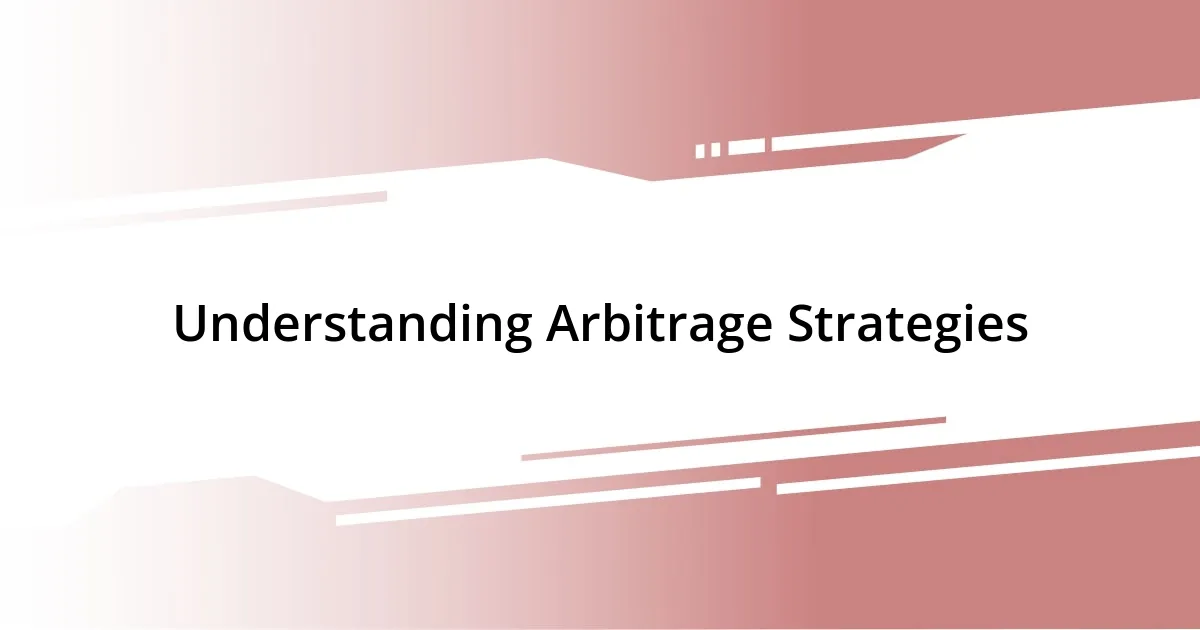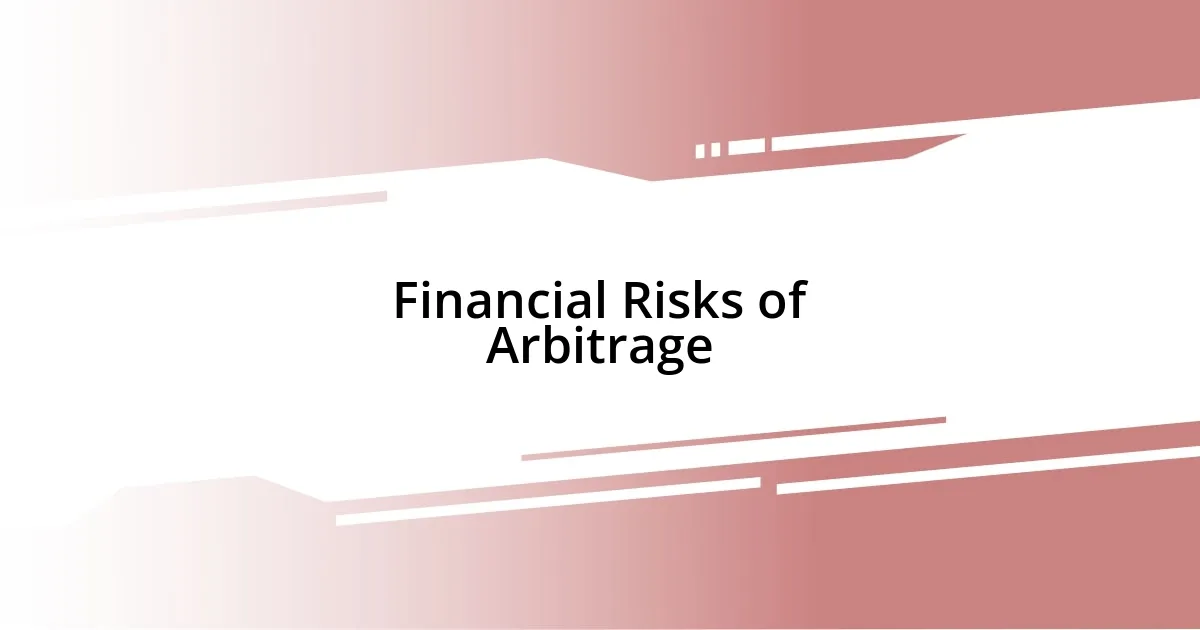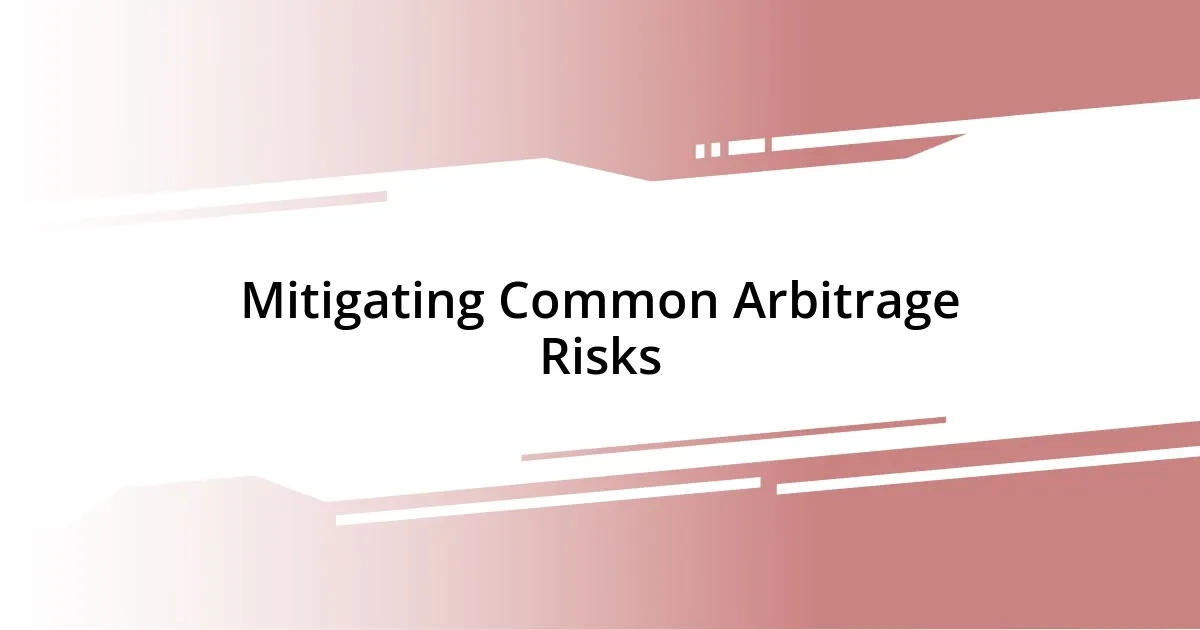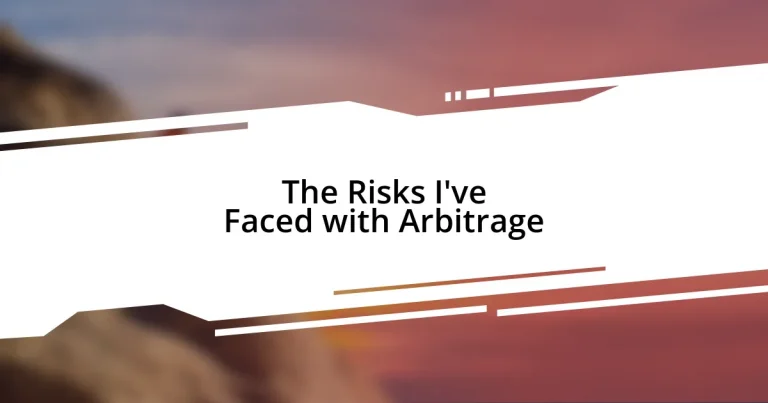Key takeaways:
- Understanding different arbitrage strategies, such as spatial and statistical arbitrage, is essential for capitalizing on market inefficiencies.
- Identifying and mitigating risks—including market volatility, execution difficulties, and regulatory challenges—is crucial for successful trading.
- Emotional composure and thorough research are key in navigating arbitrage opportunities and avoiding costly mistakes.
- Building strong trading relationships and maintaining meticulous records enhances decision-making and risk management in arbitrage trading.

Understanding Arbitrage Strategies
Arbitrage strategies are fascinating methods that allow investors to capitalize on price discrepancies across different markets. I remember when I first dabbled in this realm; I was excited to spot a sudden difference in cryptocurrency prices between two exchanges. It felt like unlocking a hidden door of opportunity right in front of me.
One of the most common strategies is spatial arbitrage, where I attempt to buy low in one market and sell high in another. The thrill of executing a trade, knowing I’m making money without any risk, is addictive. It raises a question: isn’t it amazing how technology enables us to make split-second decisions that can turn a profit?
Another prevalent strategy is statistical arbitrage, which relies on complex algorithms to identify pricing inefficiencies. I once worked on a trading model that combined historical data with real-time analysis. The moment I saw that model successfully identify a profitable opportunity felt exhilarating. Have you ever experienced that rush of discovery? It’s these moments that remind me how dynamic and rewarding the world of arbitrage can be.

Identifying Potential Risks
Identifying potential risks in arbitrage is essential for safeguarding your investments. I often reflect on the times when a seemingly perfect opportunity turned out to have hidden pitfalls. This realization hit home when I noticed a sudden market shift that resulted in unexpected losses despite my initial calculations appearing sound. It’s a stark reminder that even the best strategies must grapple with inherent uncertainties.
Here are some key risks to consider:
- Market Volatility: Prices can change rapidly, sometimes within seconds, which can erode profit margins.
- Execution Risk: The risk of orders not being filled as expected due to delays or system failures.
- Liquidity Risk: Troubles in quickly entering or exiting positions without significantly impacting the price.
- Cross-Border Regulations: Different markets often have unique rules that could affect trade execution or profitability.
- Technological Dependence: A heavy reliance on algorithms and technology can backfire if systems malfunction or data is corrupted.
Each of these factors has shaped my understanding of arbitrage, allowing me to approach potential opportunities with greater caution and awareness.

Market Volatility Impact
Market volatility is an ever-present reality that can significantly impact arbitrage opportunities. I recall a particularly intense trading day when I was set to capitalize on a price discrepancy just as the market took a nosedive. Suddenly, what seemed like a guaranteed profit turned into losses as prices fluctuated wildly, emphasizing how quick changes can transform a sure thing into complete uncertainty.
In today’s fast-paced markets, I’ve come to realize that timing is everything. There was an occasion when I almost executed a profitable trade, only to see the market swing dramatically in the minutes leading up to my decision. This experience taught me that stable conditions are crucial for executing arbitrage successfully—volatile markets can erode tight profit margins in the blink of an eye.
Lastly, navigating volatile markets requires an agility I hadn’t fully appreciated at first. I remember analyzing historical data and thinking I understood the patterns until unexpected events shattered my assumptions. Learning to adapt quickly and reassess my strategies has been essential. The thrill of arbitrage can easily turn to anxiety in unpredictable markets, and it’s vital to remain grounded and prepared for these shifts.
| Impact of Market Volatility | Example from Experience |
|---|---|
| Price Fluctuations | Saw profits vanish within seconds during a sudden market drop. |
| Timing Challenges | Missed a trade opportunity due to unexpected swings just before execution. |
| Need for Agility | Had to quickly rethink strategies as previous patterns no longer held. |

Legal and Regulatory Considerations
Engaging in arbitrage, I quickly learned that legal and regulatory considerations can be a minefield. I remember when I took a position that seemed flawless, only to discover it brushed against specific regulations in international markets. It raised questions in my mind about whether I had overlooked critical compliance details, and that uncertainty was unsettling.
One of the biggest challenges I’ve faced is navigating cross-border regulations. Regulations can differ significantly from one market to another, making it vital to stay informed. For instance, I once almost executed an arbitrage opportunity involving two countries, but I hesitated after realizing that the rules for trading foreign securities weren’t as straightforward as I initially assumed. That experience served as a key learning moment, emphasizing the importance of due diligence before diving in.
Understanding the legal framework helps mitigate risks effectively. I thought I was well-prepared, yet a regulation I hadn’t considered led to unexpected complexities in one of my transactions. Have you ever felt that rush of insecurity when you realize potential legal repercussions might arise? Trust me; it’s a lesson in humility. This journey through the legalities has taught me that a proactive approach to understanding regulations can be just as crucial as the trades themselves.

Financial Risks of Arbitrage
The financial risks associated with arbitrage are often more intricate than they appear at first glance. I vividly remember a period when I was ready to seize a seemingly perfect arbitrage opportunity—only to witness transaction costs swallow up my margins. Those fees can sneak up on you, turning what you thought would be a straightforward profit into a financial headache. Have you ever felt the bitter sting of unexpected costs? It’s a harsh but necessary lesson in the world of trading.
Moreover, leveraging borrowed capital adds another layer of risk. I once invested in an opportunity that required me to take out a margin loan, believing the potential gain outweighed the risk. However, when the market moves against you, not only do you face losses, but you also owe interest on the borrowed amount. It was a nerve-wracking experience, and in hindsight, I learned that understanding the stakes of leveraged positions is crucial.
Then there’s the problem of liquidity. I recall a situation where I miscalculated the time it would take to close out a position, leading to a delay that ultimately cost me. The market had shifted while I was stuck waiting, and I ended up selling at a loss instead of the profit I had initially planned. There’s a lesson here—liquidity can be your lifeline in arbitrage, but without it, you might find yourself in deep waters, swimming against the current. Have you ever faced a similar situation? It’s that kind of unpredictability that makes the financial landscape truly challenging.

Mitigating Common Arbitrage Risks
Mitigating risks in arbitrage often requires a keen awareness of time-sensitive opportunities. I recall a day when I spotted an arbitrage chance that seemed too good to let go. I had about 30 minutes to act before the prices adjusted. The adrenaline rush was exhilarating, but leaving nothing to chance meant double-checking the order execution process. Have you ever felt that clock ticking down while trying to secure a deal? Trust me, a meticulous approach to timing can save you from a last-minute scramble that could unravel everything.
One effective strategy I’ve adopted is diversifying my arbitrage sources. Initially, I would concentrate on just one or two markets, which felt more manageable but limited. When I broadened my scope, I found that having multiple avenues helped cushion the impact of unforeseen market fluctuations. I remember missing out on a golden opportunity in one region, only to discover that another market was ripe for arbitrage at that moment. Has this ever happened to you? It’s a lesson in resilience—having options can provide a safety net when one market doesn’t behave as expected.
Additionally, developing strong relationships with trading partners has proven invaluable in managing risks. I learned this firsthand during a turbulent market phase when my usual trading platforms were overwhelmed. By reaching out to connections who offered alternative trading solutions, I swiftly navigated around potential pitfalls. I’ll never forget how important those human connections turned out to be when push came to shove. Have you considered the power of networking in your arbitrage ventures? Building those connections isn’t just a nice-to-have; it can be a lifeline when things go awry.

Lessons Learned from My Experience
During my journey in arbitrage, I’ve learned the hard way how crucial it is to stay informed about market trends. There was a moment when I jumped at an opportunity without fully understanding the broader economic climate. The market shifted unexpectedly, and what I thought would be a quick win turned into a lesson in patience and vigilance. Have you ever raced into something, only to realize too late that you missed vital context? It’s a humbling experience that underlines the importance of doing your homework.
Another significant lesson for me was the importance of maintaining emotional composure. I remember a time when a sudden market volatility almost pushed me to make impulsive decisions. My heart raced, and I felt the typical fight-or-flight response creeping in. By taking a step back, I managed to evaluate the situation more clearly and avoided potentially costly mistakes. Isn’t it interesting how our emotions can either sharpen our judgment or cloud our vision? Learning to manage that internal dialogue has been invaluable for my arbitrage success.
Finally, I’ve come to appreciate the value of meticulous record-keeping. Early on, I didn’t track my trades as diligently as I should have, leading to confusing moments down the line. I found myself wondering what strategies had actually worked and which hadn’t. By keeping detailed notes, I’ve been able to reflect on my decisions and continuously improve my approach. Have you ever wished you could rewind time to see what went wrong? It’s that kind of insight that fosters growth and reliability in the often unpredictable world of arbitrage.














